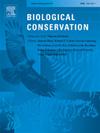Stakeholder workshops on western Baltic cod fisheries–conflict and consensus in the face of a highly dynamic ecosystem
IF 4.9
1区 环境科学与生态学
Q1 BIODIVERSITY CONSERVATION
引用次数: 0
Abstract
A shift in ecological systems often produces or exacerbates conflicts among different stakeholders within the corresponding socio-ecological system. One approach to resolution is to involve the various parties in participatory processes (e.g., in a workshop setting) and work towards co-design of management recommendations. Using the western Baltic cod (Gadus morhua) fishery as case study, this research documents a series of stakeholder workshops which happened to take place during the rapid deterioration of the stock. This overlap shed light on challenges for established fisheries management and conservation systems when confronted with rapid, unforeseen changes of the corresponding ecosystems and stakeholder involvement in such situations. The aspiration of the workshops including participatory cognitive mapping was to understand stakeholder perceptions and work towards mutually agreed management recommendations - a goal that became more elusive as the stock collapsed and the fishery was closed during the process. Such situations may become more common in the context of ever-increasing anthropogenic pressures on aquatic ecosystems, including climate change, habitat degradation, and overfishing. The workshops engaged four different stakeholder groups: commercial fishers, recreational fishers, environmental non-governmental organizations, and fisheries authorities. Conflicts were identified with regard to human-wildlife interactions, the role of scientific contributions and competition between commercial and recreational fisheries. Consensus was reached regarding the impact of external factors, particularly eutrophication, and the need for fisheries management and specific management measures. This study documents the workshop results and experiences, reports lessons learnt and translates these into possible steps forward.
求助全文
约1分钟内获得全文
求助全文
来源期刊

Biological Conservation
环境科学-环境科学
CiteScore
10.20
自引率
3.40%
发文量
295
审稿时长
61 days
期刊介绍:
Biological Conservation is an international leading journal in the discipline of conservation biology. The journal publishes articles spanning a diverse range of fields that contribute to the biological, sociological, and economic dimensions of conservation and natural resource management. The primary aim of Biological Conservation is the publication of high-quality papers that advance the science and practice of conservation, or which demonstrate the application of conservation principles for natural resource management and policy. Therefore it will be of interest to a broad international readership.
 求助内容:
求助内容: 应助结果提醒方式:
应助结果提醒方式:


